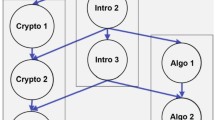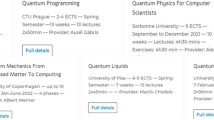Abstract
Quantum Computing (QC) has gained a constantly rising level of attention and interest in the last years from academic institutions and research teams in the industry alike. Although several serious games (SG) for QC are available to date, the specific learning needs of IT professionals are not sufficiently covered to equip them with a knowledge base on the fundamental concepts of QC. Based on an analysis of 12 current SGs in QC, we have identified the concept of Entanglement as an underrepresented learning objective and have developed a SG around Quantum Entanglement using the Greenberg-Horne-Zeilinger (GHZ) experiment as a joint project in cooperation with the IBM Quantum Ambassadors team.
This paper advances the knowledge base within the field of SGs and learning across three dimensions: (1) it identifies Quantum Entanglement as underrepresented learning topic in the array of QC concepts covered by SGs, (2) provides a case study on the development of a SG in the application domain QC for a business context, and therefore (3) fundamentally adds to the understanding how and with whom such a SG is used in the advanced professional computing industry.
Access this chapter
Tax calculation will be finalised at checkout
Purchases are for personal use only
Similar content being viewed by others
Notes
- 1.
Available under CC-license on github (https://github.com/JanLahmann/Fun-with-Quantum).
- 2.
Documents that can contain interactive code cells (programmed in Python), equations, visualizations and explanations.
References
Chow, J.; Gambetta, J.: Quantum Takes Flight: Moving from Laboratory Demonstrations to Building Systems. IBM Research Blog (2020). https://www.ibm.com/blogs/research/2020/01/quantum-volume-32/. Accessed 22 June 2020
Mermin, N.D.: Quantum Computer Science: An Introduction. Cambridge University Press, Cambridge (2007)
Woerner, S., Egger, D.J.: Quantum risk analysis. npj Quantum Inf. 5 (2019). Paper 15. https://doi.org/10.1038/s41534-019-0130-6
Airbus Innovation: Airbus Quantum Computing Challenge. https://www.airbus.com/innovation/tech-challenges-and-competitions/airbus-quantum-computing-challenge.html. Accessed 08 July 2020
Nielsen, M.A., Chuang, I.L.: Quantum Computation and Quantum Information. Cambridge University Press, Cambridge (2010)
Einstein, A., Born, M.: Briefwechsel 1916-955. Müller Verlag, Langen (2005)
C. Conati, Zhao, X.: Building and evaluating an intelligent pedagogical agent to improve the effectiveness of an educational game. In Proceedings of the 9th International Conference on Intelligent User Interfaces (IUI 2004). Association for Computing Machinery, New York, pp. 6–13 (2004). https://doi.org/10.1145/964442.964446
Johnson, W.L.: Serious use of a serious game for language learning. In Proceedings of the 2007 Conference on Artificial Intelligence in Education: Building Technology Rich Learning Contexts That Work, pp. 67–74. IOS Press, NLD (2007)
Millis, K., Forsyth, C., Butler, H., Wallace, P., Graesser, A., Halpern, D.: Operation ARIES!: a serious game for teaching scientific inquiry. In: Ma, M., Oikonomou, A., Jain, L.C. (eds.) Serious Games and Edutainment Applications, pp. 169–195. Springer, London (2011). https://doi.org/10.1007/978-1-4471-2161-9_10
Rowe, J.P., Shores, L.R., Mott, B.W., Lester, J.C.: Integrating learning, problem solving, and engagement in narrative-centered learning environments. Int. J. Artif. Intell. Educ. 21(1–2), 115–133 (2011)
Dorland, B., et al.: Quantum physics vs. classical physics: introducing the basics with a virtual reality game. In: Liapis, A., Yannakakis, Georgios N., Gentile, M., Ninaus, M. (eds.) GALA 2019. LNCS, vol. 11899, pp. 383–393. Springer, Cham (2019). https://doi.org/10.1007/978-3-030-34350-7_37
Bommanapally, V., Subramaniam, M., Chundi, P., Parakh, A.: Navigation hints in serious games. In: Beck, D., et al. (eds.) Online Proceedings from First Immersive Online Learning Network Conference, Technische Universität Graz (2018)
Abeyrathna, D., Vadla, S., Bommanapally, V., Subramaniam, M., Chundi, P., Parakh, A.: Analyzing and predicting player performance in a quantum cryptography serious game. In: Gentile, M., Allegra, M., Söbke, H. (eds.) GALA 2018. LNCS, vol. 11385, pp. 267–276. Springer, Cham (2019). https://doi.org/10.1007/978-3-030-11548-7_25
Meetup. https://www.meetup.com/de-DE/meet-and-think-at-ibm/events/268534178/. Accessed 05 July 2020
IEEE QCE20. International Conference on Quantum Computing & Engineering. https://qce.quantum.ieee.org/tutorials/. Accessed 05 July 2020
Homeister, M.: Quantum Computing verstehen: Grundlagen – Anwendungen –Perspektiven. Springer Vieweg, Wiesbaden (2018). https://doi.org/10.1007/978-3-658-22884-2
Baumhof, A.: Quantum leap: why the next wave of computers will change the world. World Economic Forum (2019). https://www.weforum.org/agenda/2019/10/quantum-computers-next-frontier-classicalgoogle-ibm-nasa-supremacy/. Accessed 05 July 2020
Statista (2020). https://www.statista.com/statistics/993634/quantum-computers-by-number-of-qubits/. Accessed 05 July 2020
Wilhelm, F.K., et al.: Status of Quantum Computer development. BSI, Federal Office for Information Security (2019). https://www.bsi.bund.de/EN/Topics/Crypto/Cryptography/QuantumComputing/quantum_computing_node.html. Accessed 05 July 2020
Guidotti, R.: The Power of Destructive Interference in Quantum Computing (2015). https://doi.org/10.13140/rg.2.1.2067.4008. Accessed 05 July 2020
Vaidman, L.: Variations on the theme of the Greenbeger-Horne-Zeilinger proof. Found. Phys. 29, 615–630 (1999)
Huizinga, J.: Homo ludens: Versuch einer Bestimmung des Spielelementes der Kultur. Pantheon, Amsterdam (1939)
Dörner, R., Göbel, S., Effelsberg, W., Wiemeyer, J. (eds.): Serious Games. Springer, Cham (2016). https://doi.org/10.1007/978-3-319-40612-1
Gambetta, J.; Chow, J.: Quantum computing: it’s time to build a quantum community (2016). https://www.ibm.com/blogs/research/2016/05/quantum-computing-time-build-quantum-community/. Accessed 05 July 2020
Qiskit: Welcome to Quantum (2020). https://qiskit.org. Accessed 05 July 2020
IBM Research: Entanglion (2019). https://entanglion.github.io. Accessed 05 July 2020
IBM: Hello Quantum (2018). http://helloquantum.mybluemix.net. Accessed 05 July 2020
Huang, J.: QPong: a quantum version of the classic Pong using Qiskit and pygame. https://github.com/HuangJunye/QPong. Accessed 20 Apr 2020
Lahmann, J.R.: How Quantum Power Helps to Win a Coin Game (2020). http://ibm.biz/QiskitCoinGame. Accessed 05 July 2020
GitHub: Quantum Battleships with partial NOT gates. Github (2019). https://github.com/Qiskit/qiskit-community-tutorials/blob/master/games/battleships_with_partial_NOT_gates.ipynb. Accessed 05 July 2020
Decodoku: Hunt the Quantpus. https://decodoku.itch.io/hunt-the-quantpus. Accessed 05 July 2020
Decodoku: Quantum Solitaire. https://decodoku.itch.io/quantum-solitaire. Accessed 05 July 2020
Quantum TicTacToe: Play the game (2019). https://quantumtictactoe.com/play. Accessed 05 July 2020
GitHub: Quantum Poker. Github (2020). https://github.com/sintefmath/QuantumPoker. Accessed 05 July 2020
GitHub: Qiskit Blocks. Github (2019). https://github.com/JavaFXpert/QiskitBlocks. Accessed 05 July 2020
GitHub: Quantum Awesomeness (2018). https://github.com/decodoku/A_Game_to_Benchmark_Quantum_Computers/blob/master/README.md. Accessed 05 July 2020
Truly Quantum Chess: Truly Quantum Chess Alpha (2017). https://truly-quantum-chess.sloppy.zone. Accessed 05 July 2020
Thomas, A.T.: Hidden in Plain Sight 10: How to Program a Quantum Computer. Createspace Independent Publishing Platform (2018)
Mohrhoff, U.: A Quantum Game. This Quantum World (2018). https://thisquantumworld.com/the-mystique-of-quantum-mechanics/a-quantum-game/. Accessed 05 July 2020
Acknowledgements
We would like to thank Dr. James Wootton (IBM Research) for discussing our ideas of the game and design of a Serious Game for Quantum Computing and for his help in streamlining our setup for the target group of IT professionals.
Author information
Authors and Affiliations
Corresponding author
Editor information
Editors and Affiliations
Rights and permissions
Copyright information
© 2020 Springer Nature Switzerland AG
About this paper
Cite this paper
Heider, I., Bendl, H., Lahmann, JR., Mörike, F. (2020). Approaching Quantum Entanglement Developing a Serious Game in Quantum Computing for IT Professionals. In: Marfisi-Schottman, I., Bellotti, F., Hamon, L., Klemke, R. (eds) Games and Learning Alliance. GALA 2020. Lecture Notes in Computer Science(), vol 12517. Springer, Cham. https://doi.org/10.1007/978-3-030-63464-3_5
Download citation
DOI: https://doi.org/10.1007/978-3-030-63464-3_5
Published:
Publisher Name: Springer, Cham
Print ISBN: 978-3-030-63463-6
Online ISBN: 978-3-030-63464-3
eBook Packages: Computer ScienceComputer Science (R0)




